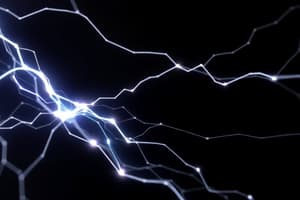Podcast
Questions and Answers
Which of the following is a property of isotopes?
Which of the following is a property of isotopes?
- They behave differently in chemical reactions.
- They have different numbers of protons only.
- They have different electron configurations.
- They have the same number of protons but different numbers of neutrons. (correct)
Electromagnetic waves can travel through a vacuum.
Electromagnetic waves can travel through a vacuum.
True (A)
What is the principle of conservation of energy?
What is the principle of conservation of energy?
Energy cannot be created or destroyed, only transformed from one form to another.
The mass of an object multiplied by the gravitational field strength gives its ______.
The mass of an object multiplied by the gravitational field strength gives its ______.
Match the following concepts with their descriptions:
Match the following concepts with their descriptions:
Which chemical reaction type is characterized by absorbing heat?
Which chemical reaction type is characterized by absorbing heat?
Current is the flow of electrons through a conductor.
Current is the flow of electrons through a conductor.
What is the primary function of enzymes in biological processes?
What is the primary function of enzymes in biological processes?
In a series circuit, the total resistance is equal to the sum of the ______ resistances.
In a series circuit, the total resistance is equal to the sum of the ______ resistances.
Which of the following best describes Hooke's law?
Which of the following best describes Hooke's law?
Flashcards
Atomic Structure
Atomic Structure
The arrangement of protons, neutrons, and electrons in an atom.
Density
Density
Mass per unit volume of a substance.
Specific Heat Capacity (SHC)
Specific Heat Capacity (SHC)
The amount of energy required to raise the temperature of 1 kg of a substance by 1°C.
Hooke's Law
Hooke's Law
Signup and view all the flashcards
States of Matter
States of Matter
Signup and view all the flashcards
Series Circuit
Series Circuit
Signup and view all the flashcards
Parallel Circuit
Parallel Circuit
Signup and view all the flashcards
Isotopes
Isotopes
Signup and view all the flashcards
Half-life
Half-life
Signup and view all the flashcards
Photosynthesis
Photosynthesis
Signup and view all the flashcards
Study Notes
Physics
- History of the atom and atomic structure
- Density
- Particle theory and states of matter
- SHC
- Pressure of gases
- Mass, weight and gravity
- Mechanical energy stores
- Work done and power
- Forces and elasticity
- Investigating Hooke's law
- Static electricity
- Current and potential difference
- Circuits – the basics
- Resistance and V=IR
- Circuit devices
- Series and parallel circuits
- More on series and parallel circuits
- Energy and power in circuits
- Wave basics
- Wave experiments
- Wave reflection
- More on reflection
- Refraction
- More on refraction
- Electromagnetic waves
- More on electromagnetic waves
- Uses of EM waves
- More uses of EM waves
- Isotopes and Radioactive decay
- Radiation properties and decay equations
- Electron energy levels
- Half-life
- Dangers of radioactivity
- Conservation of energy
- Efficiency
- Energy transfer by heating
Chemistry
- States of matter
- The atom
- Density
- Particle theory and states of matter
- Atomic Structure
- Electron shells
- The periodic table
- Atoms, ions and isotopes
- Ionic bonding
- Ionic compounds
- Simple molecules
- Giant covalent structures
- Fullerenes
- Metals
- Polymers and properties of materials
- Purity
- States, structure and bonding
- Distillation
- Filtration and crystallisation
- Chromatography
- Interpreting chromatograms
- Relative masses
- Endothermic and exothermic reactions
- Bond energies
- Acids and bases
- Strong and weak acids
- Reactions of acids
- Making salts
- Tests for gases
- Group 1 and Group 7
- Halogen displacement reactions
- Group 0
- Reactivity of metals
- The reactivity series and displacement
- Reaction rates and experiments
- Calculating rates
- Collision theory
- Catalysts
- Hydrocarbons and Cracking
- Atmosphere
- Greenhouse effect
- Global warming
- Pollutants and water treatment
Biology
- Cells and microscopy
- Light microscopy
- More on light microscopy
- DNA
- Enzymes
- More on enzymes
- Investigating enzyme activity
- Respiration
- More on respiration
- Biological molecules
- Photosynthesis
- Rate of photosynthesis
- The cell cycle and mitosis
- Cell differentiation and stem cells
- Diffusion and active transport
- Osmosis
- Exchanging substances
- Exchange surfaces
- More on exchange surfaces
- The circulatory system
- The blood vessels
- The blood
- Plant transport systems and transpiration
- More on transpiration
- Investigating transpiration
- Genes and variation
- More on variation and genetic variants
- Sexual reproduction and meiosis
- Sex determination and asexual reproduction
- Genetic diagrams
- Classification
- Evolution and natural selection
- Evidence for evolution
- Investigating distribution and abundance
- Using keys and factors affecting distribution
- Using transects
- Human impacts on ecosystems
- Maintaining biodiversity
- Selective breeding
- Genetic engineering
- More on genetic engineering
Studying That Suits You
Use AI to generate personalized quizzes and flashcards to suit your learning preferences.




